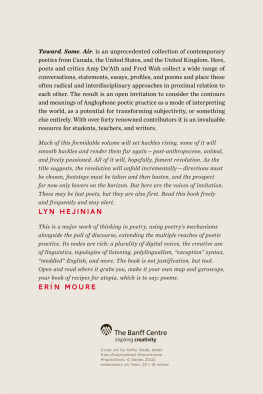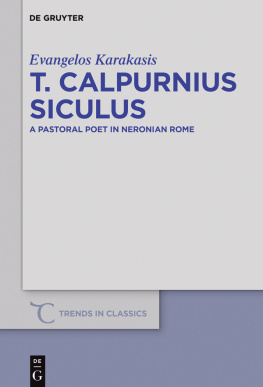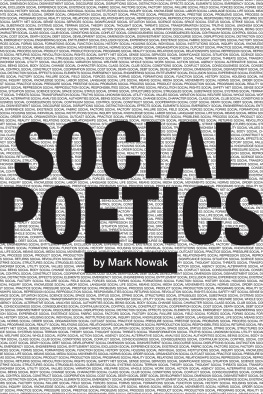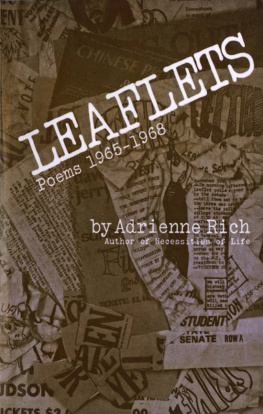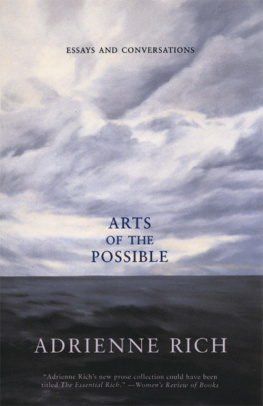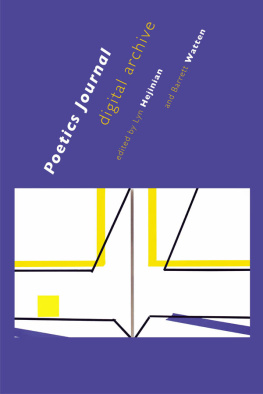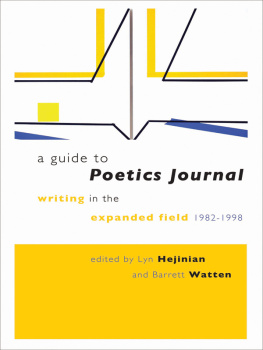Toward.
Some.
Air.

Copyright 2015 by the contributors
Any unauthorized reprint or use of this material is prohibited. No part of this book may be reproduced or transmitted in any form or by any means, electronic or mechanical, including photocopying, recording, or by any information storage and retrieval system without express written permission from the publisher, or in the case of photocopying, a license from the Canadian Copyright Licensing Agency, Access Copyright.
Library and Archives Canada Cataloguing in Publication
Toward. Some. Air. : remarks on poetics of mad affect, militancy, feminism, demotic rhythms, emptying, intervention, reluctance, indigeneity, immediacy, lyric conceptualism, commons, pastoral margins, desire, ambivalence, disability, the digital, and other practices / edited by Fred Wah & Amy DeAth.
Includes bibliographical references and index.
Issued also in print and electronic formats.
ISBN 978-1-894773-80-5 (paperback). ISBN 978-1-894773-81-2 (epub). ISBN 978-1-894773-82-9 (mobi)
1. Poetics. 2. Poetry Social aspects. 3. English poetry 21st century. 4. American poetry 21st century. 5. Canadian poetry 21st century. I. Wah, Fred, 1939, editor II. DeAth, Amy, 1985, editor
PN1042.T69 2015 | 808.1 | C2015-901482-4 |
C2015-901483-2 |
Cover art by Kathy Slade, detail from Embroidered Monochrome Propositions: O Series, 2002, embroidery on linen, 20 18 inches
Banff Centre Press
Box 1020
107 Tunnel Mountain Drive
Banff, Alberta, Canada T1L 1H5
www.banffcentrepress.ca

The Banff Centre is pleased to acknowledge the generous donors who have given financial support to Banff Centre programming and Banff Centre Press.
Printed and bound in Canada
It was another representation baby hadnt represented. Hadnt known to represent. A fellow feeling swallowed down into her stomach, her gut bulged and her hands looked for someplace to go. She was behind bars yelling at injustice and ignored again.
Carla Harryman, Baby
CONTENTS
Any poetics anthology implicitly makes claims: here is a new historical moment, or here are the writers worth reading, or here is a new generation. But how can such claims be anything but false, reductive, and exclusionary? Given that the present conditions of cultural production are capitalist, and therefore upheld by gender, race, and class oppression, it would be nave to imagine that we can operate outside of them. Yet this book inevitably makes claims too, and perhaps chief among those is that poetry still operates as a powerful and convincing critique of the social. This belief is asserted in a number of ways by the works collected here: from Jeff Derksens suggestion that sincerity as a form of address can dislodge the conventional affective security of representational arts relation to politics; to Kaia Sands feminist collective memoir, documenting the lives of activist women under police surveillance by pounding a sledgehammer onto pieces of pewter; to Nicole Markoti and Michael Davidsons discussion of how disability intervenes in language, representation, and purposive action; to Fred Motens poem the gramsci monument and Jos Muozs reading of it as a call to simultaneously bust up and love the projects here in the sense both of the art project and the housing project.
The positions articulated in this anthology are vastly different, crossing generational, geographical, and theoretical borders, and in this sense we are aiming to encourage dialogue by proximity but also to suggest a looking-outwards; not so much towards other individual poets but towards other poetics and ways of being in the world. In this spirit some of the pieces included here advocate different ways of listening. Kateri Akiwenzie-Damm and Christine Stewart emphasize the importance of listening for a politics of decolonization in the settler-colonial state of Canada; Maria Damon, speaking of her position as a critic, modestly characterizes herself as the cheerleader, the friend of poets, the poetry-enabler; Sean Bonney and Stephen Collis discuss the difficulties of listening to the cacophony of voices present in a collective, and the dangers of privileging the poet-subject who imagines s/he might speak for, rather than with, the otherwise excluded subject who is wrongly perceived as voiceless. For many of the poets in this book, listening is a political practice that moves away from the individuating compulsions of singular authorship and towards modes of collectivity, perhaps to imagine what a collective subjectivity might mean. For all its difference, the work collected here is also testament to a widespread interest in the relation between poetry and social change, or between poetry and revolution, even as the latter may involve an assertion that poetry cannot do the same work as a gathering of bodies at a protest or a riot.
It is also my hope that these conversations, statements, interviews, essays, and poems provide some examples from which we might think again about the troubled relation between art and labour, about the poems social immersion, about the problems that arise when we demand that any artwork magically de-commoditize itself in the service of social critique, to speak as some omniscient subject, as it were. One thing this book implicitly turns away from, for example, is the investment in an elitist revival as opposed to more invitational citation of previous arts-world discourse (Surrealism, Dadaism, Conceptualism, etc.) and the right to some sort of purely aesthetic form of confrontation that strives to resegregate art from other political concerns.
We were always aware of that perennial problem specific to the anthology genre: that our selections were in some sense arbitrary. Whether they were the result of a particular pull or, indeed, a resistance to such a pull, they were selections made from within the confines of our own limited purview. We know such acknowledgements are insufficient; especially in the context of an Anglophone sphere of contemporary poetry still so dogged by a cultural elitism that is always finally rooted in the racist and sexist structures upon which capitalism depends. Nevertheless, weve tried to avoid the tyranny of canonicity and overdetermined categorizations particular to educational anthologies, and to arrange a disparate and in that sense atypical collection of voices not without its own set of internal contradictions and tensions in the pages that follow. Freds longstanding commitment and attentiveness to poetry in Canada and the U.S. have been invaluable in this process.
This book has been assembled, mainly, from Vancouver: a city situated on the unceded Coast Salish Territories of the Musqueam, Squamish, Tsleil-Waututh, and St:l First Nations. Coast Salish peoples are among the most violently displaced by colonization, yet their struggles as part of Idle No More and the revolutionary Rising Tide protest movements against the Canadian petro-states disregard for fundamental Indigenous rights and against oil pipeline expansions are testament to their historical commitment to decolonization, and as an uninvited guest on this land I would like to acknowledge my multifaceted indebtedness to the Coast Salish peoples.
Amy DeAth
Vancouver, Canada
Next page
